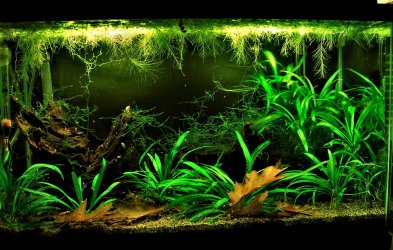I will make water changes but like I said just about 10%-15% every month (probably more at the begining). There will be the bioload of a 2 inch fish and a snail, do you think it could work? How do water change affect fish?
If I had a 2-inch fish in my 10g tank,. the tank would have a weekly water change of 60%. And my 10g is full of plants. The photo attached is the last one of this tank, from 2.5 years ago, but it gives you an idea of the plants/space; the group of pygmy cories and fry are in the back, and there are 5 or 6 Farlowella vitatta fry--I used this tank as their grow-out space, hence the leaves. The pygmies spawned regularly.
After I moved the cories and fry to their new respective tanks last autumn, I am now keeping the 10g to use as my quarantine for new fish acquisitions (if I am ever able to get new fish!). Without fish and with just the plants, I am doing a 50% W/C every three weeks on average. When I had my larger fish room before my move least year, a 20g was kept permanently running with plants to use for new fish, and I did pretty much the same W/C schedule. I never use conditioner when there are no fish present.
How do water changes affect fish? Easy answer is, the more water changed the more often, the healthier the fish will be. Provided the parameters are relatively close between tap water and tank water [this to ensure no pH, GH, KH, temperature shock], you really cannot change too much water. Every respiration a fish takes in its habitat is basically fresh water. We cannot even come close to this in an aquarium. I realize this is sometimes hard to get across. Each of us sits in front of our aquarium and we see the fish cavorting around, "being a fish," and we tend to think to ourselves, "my fish are happy." But there is no way we can know that, unless the fish talks to us. Observation can hopefully spot serious problems, but by then it is long past the assumed "happy" stage we accepted for so long. Fish surviving do not appear or behave much differently from fish thriving, but it is a world of difference to the fish. Fish will try to make the best of whatever situation we force on them...and it is forced, because they have no way of escaping it. A dog or cat we may mistreat--unintentionally--can and will move away. The fish does not have this opportunity. In nature, fish survive many issues by being able to move away--move away from that toxic substance entering the water, move away from the collector's net, move away from fast water, move away from predators, etc.
From those who study fish, we learn how fish function, what they need to function at their best, and what prevents this from occurring. We can only assume the fish will be at its best in terms of health and physiological functioning the closer it is being maintained to its habitat. Freshwater fish have evolved over thousands of years to function in a very specific environment--environment meaning water parameters, habitat features, numbers, other fish--and they will only be at their best in that environment. We can create that environment quite closely in an aquarium if we want to; we will never equal it, but if we want the fish to be healthy--and "happy" whatever that may mean--we must ensure we understand all its needs and provide the best we can.



